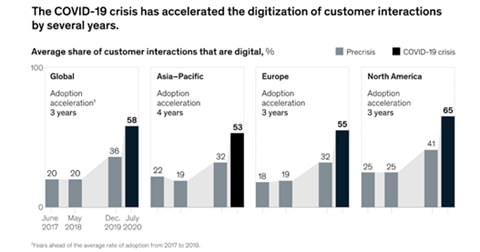Blog updated on 17th February 2022 by Tye Howitt
Covid-19 has impacted so many areas of business and life over the past few years. One area on which it has had an unprecedented impact is digital transformation. The pressure for businesses to fast-track their digital transformation journeys was kicked into overdrive in 2020 and this pressure has not eased since.
There has long been a need for businesses to adapt; to harness the power of data and streamline their digital processes. The Covid-19 crisis has forced businesses to reprioritise these changes, making these elements of digital strategy essential, and provoking change at a frightening pace.
During the pandemic, customers moved dramatically towards online channels, and companies and industries were compelled to respond. Multiple studies have confirmed this rapid shift to digital. A recent McKinsey study, for example, found that business's digital offerings leapfrogged over seven years of progress in the first few months of the Covid-19 pandemic.

The table above illustrates perfectly just how monumental this impact was - and still is. Thanks to Covid-19, we are almost a decade ahead of where we were, going into the pandemic.
It must be said that the pandemic has also impacted customer expectations. Before the pandemic, customer experience and customer-friendly apps were becoming increasingly important. Now, fast forward just two years and a customer-first approach is mandatory for businesses that are looking to build and sustain a successful brand.
Customers now have a near infinite level of choice at their fingertips and when you factor in the constantly diminishing human attention span that has been exacerbated by the pandemic, the margin for error in winning and keeping customers narrows day by day. Super responsive front line support services, customer-friendly apps, simple buying processes, and speed of delivery are now paramount.
The pandemic has pushed through a new age of working. Going into the office is no longer a necessity - and probably won't ever be a necessity again. All of this is due to the pandemic and was made possible by digital transformation.
Just consider the example of video conferencing. We've had this capability for years, but we never quite realised its full potential. Now, video calls are an essential part of our day, proving their worth far beyond hosting meetings remotely. Many companies have found a pragmatic middle-ground between the office and remote work. And some have gone even further, abandoning the office in favour of the flexibility of a completely virtual workplace.
It must be said however, that these technological leaps have not come without their fair share of growing pains. Enabling remote work for instance, involved a huge number of challenges. Whether it was issues in relation to cybersecurity (with the number of cyber hacks reaching all-time highs during the pandemic) or the need for more cohesion between HR and IT departments, companies had a lot to deal with.
Having tracked what has happened to digital transformation over the past 2 years, let's move on to discuss where we are going in the future.
The Covid-19 crisis has pushed businesses to adopt cloud technologies to reduce business continuity risks enable remote work and improve security.
Multi-cloud architecture is the process of distributing software and workloads within an organisation across a combination of two or more private or public clouds.
A multi-cloud strategy may be chosen for a variety of reasons, including disaster recovery, data residency requirements, and resilience. We are very likely to see this trend at the forefront of anything digital, in years to come.
Artificial Intelligence, or AI , has the potential to accelerate digital transformation within a business, making it one of the most important digital transformation trends for 2022.
The democratisation AI means making AI accessible to every organisation, and if possible, every person within that organisation.
This involves using AI-based tools to spot and recognise trends, make decisions, forecast, learn, and improve.
Automation is a key factor in any digital transformation journey. When one is adopted, the other tends to follow. Companies can increase the pace of their organisation's digital transformation by automating more and more of their processes.
Companies can also turn to cloud-based automation systems for increased scalability and lower total cost of ownership.
As previously discussed, cyber-attacks are at an all-time high, with over 445 million cyber-attacks taking place during the first 3 months of the pandemic in 2020 alone. This increase in threat levels is likely to continue in the coming years, making a focus on cybersecurity more important than ever.
We believe that our customers should have access to world class cloud solutions that are intuitive, scalable and secure.
We empower customers through the use of Cloud technologies to automate processes, connect ecosystems, analyse performance, and improve future outcomes.
To find out how LAKE could help you on your digital transformation journey, please get in touch via the LAKE website or call me now on 0113 273 7788.

by Tye Howitt
Blog Contributor.